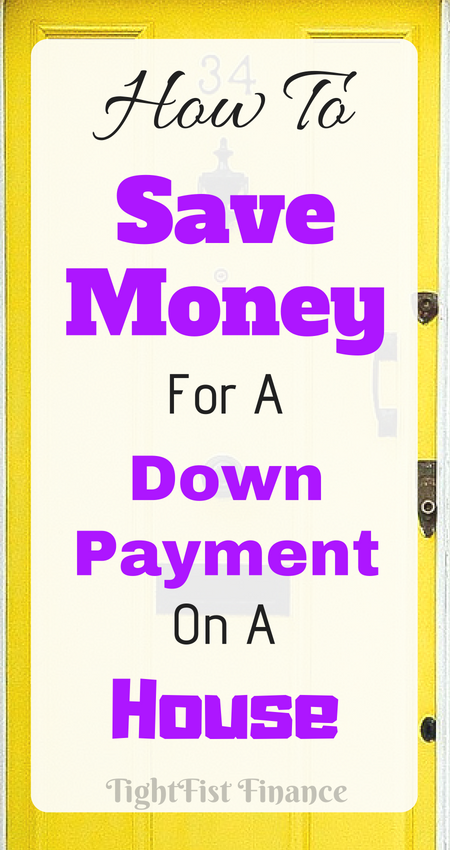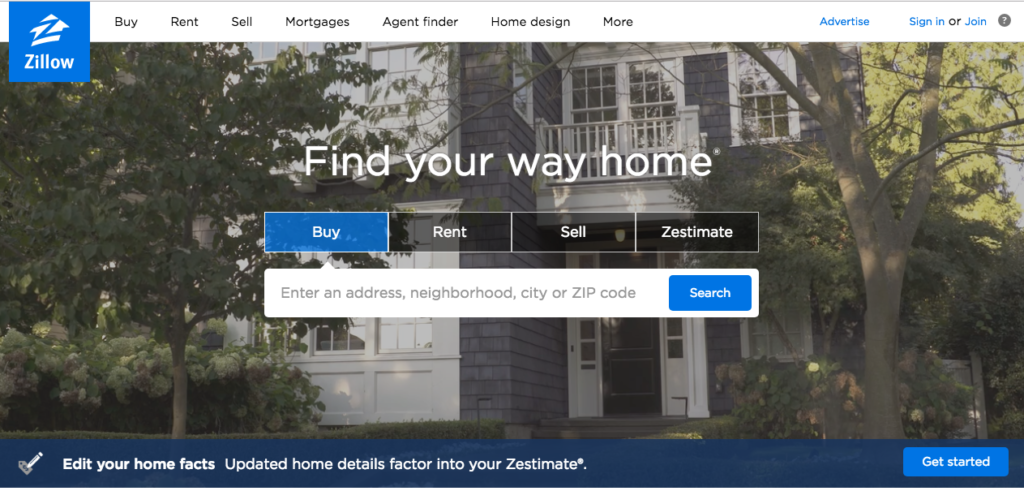Tired of renting and ready for your own place?
I don’t blame you. Back in college, I lived in an apartment complex where the girls living above me must have been practicing acrobatics at 5 a.m.!
While home ownership does have it’s drawbacks, I don’t miss renting at all! So how can you escape your annoying apartment neighbors?
Well, it all starts with saving money for a down payment. Today’s article is all about saving enough money so that you can leave the apartment lifestyle behind! If you want to save more money, consider joining our free course on budgeting and saving money!

This post may contain affiliate links which provide a commission which supports this blog. Thank you for your support!
How to save money for a down payment on a house
Buy a modest first home
Picking your price range is the first thing you should do when looking for a house. I like to browse Zillow to get an idea of home value and quality.

Zillow is a great research tool that will help you understand what neighborhoods you should consider looking at. Spending time on Zillow lets you know how much house you can get for your money.
You should look for a modest first home and aim to pay it off. Houses are one of the biggest expenses people have. Keeping your mortgage payment small helps to prevent you from not being able to afford the other aspects of your life.
Related:
- How to PAY OFF your home fast! How we paid off 40% of our mortgage in 2 YEARS.
- The ultimate guide to PAYING OFF DEBT!
Set a savings goal: 20% of home value + any extra needs
You’ll need to set a savings goal after you’ve picked out a price range. Most people recommend saving a minimum of 20% of the house value.
Saving 20% of the house value helps you avoid PMI. PMI is an extra charge the bank throws on your mortgage if your downpayment is under 20% of the home value. It supposedly reduces the risk that you’ll default on your loan, causing the banks to lose their money.
PMI is a waste of your money that could be used to pay the house off. PMI does not go toward paying off your house any sooner. Let’s say your PMI was $100 per month. You would pay an extra $36,000 in PMI over the course of a 30-year loan.
Don’t forget you may be walking into an empty home. That means you might not have a washer/dryer, refrigerator, or dishwasher. You’ll want to make sure that you have enough money to buy these things when you get your first home.
Related:
- How to recover from a BAD financial month.
- Here’s how to teach your child the value of money so they don’t become wasteful as an adult.
Create a monthly budget
Budgeting is one of the best ways for you start saving money towards your downpayment. You’ll want to build an effective budget if you don’t already have one!
Budgeting is going to allow you to identify where your money is going and maximize your savings. A budget is a plan for your money so that you know where every dollar earned is going.
The best part about budgeting is that it will give you an idea of when you’ll hit your savings goals. If you need $5,000 and your budget lets you save $500 per month, you’ll reach your goal in 10 months!
Share this article on twitterClick To TweetDo you have an emergency fund?
I’ve already talked about buying a house with 20% down payment plus extra for any appliances. However, are you financially ready for an emergency?
Things break down and that’s just a fact of life. Are you financially prepared if your car breaks down or you lose your job? What is your plan to survive a financial hardship?
The answer is to build an emergency fund. An emergency fund is money set aside for a financial crisis. A good emergency fund will let you survive 3-6 months without any income.
Keep in mind your expenses will change when you buy a house. So make sure you’ve updated your emergency fund to last you with your new house expenses.
Related:
Make your savings automatic
Who wants to think about saving money? Life is too busy to sit down and plan. So if you’re struggling to plan your money savings, why not automate it?
Have you ever intended on saving the leftover pizza for dinner, but ate it before 9 a.m.? Knowing the pizza is in the fridge and is easily accessible eats away at us! We had the intention of saving the pizza, but it also makes a great snack.
The same is true with our money. Keeping the money in your checking account makes it too accessible to spend. You might get paid by direct deposit. Have you considered sending a portion of your paycheck to a separate savings account?
Try and save your money first and then live off the rest. You will find yourself saving more money in less time.
Save any bonus money
Does this sound like you?
Boss: “It’s that time of year where we hand out bonuses. You’ve done a really great job for the company and I want to thank you. Here’s your bonus of $500, keep up the good work!
You: “Thanks boss!”
*later that evening*
You: “Hey person I’m married to. I got a $500 bonus today! What should we spend it on?”
This happens all the time! We are so quick to spend any extra money we get. Try and save any of the extra money for your down payment on a house. Don’t waste your newfound money on something. Use it to enhance your life!
Work Overtime or a second job
When trying to afford a house, you need focus and dedication. A home is an expensive goal and it feels amazing to save enough for a down payment. How can you earn more money in a shorter amount of time?
Unfortunately, I don’t have a money press. Even if I did, it’s still illegal to make your own money. For most of us that means working more overtime or finding a second job.
No one wants to work more. Work is already a horrible enough place that steals all your time. However, it’s a good way to earn a few extra bucks temporarily.
Look at it this way. Let’s say you have $100,000 to pay off and you can save $1,000 per month to pay towards this debt. You could have it paid off in 100 months or 8.33 years.
Now you might work 10 hours of overtime a week, earning an extra $200 a week or $800 per month. You can now pay $1,800 per month towards your $100k debt, paying it off in 56 months or 4.66 years.
Rent vs Mortgage costs
In some situations, it makes sense to buy a house now. You should consider buying if you can get a mortgage payment for what you’re paying in rent. Keep in mind that you will still have to pay for expenses that do come with the house.
You have to live somewhere, so why not buy a house and build equity if you can afford it? You’ll never see your money again every time you pay rent. Every mortgage payment builds equity meaning you’ll get money back if you sell the house later.
I was tired of paying $850 in rent every month. Interest rates were low and I knew I could get into a house for about the same price. So I evaluated my budget, made some changes, and found a house I could afford.
The home I found is way nicer than my old rental. The best part? The mortgage payment is only an extra $200 more. I could have found a place cheaper in my area and had a monthly payment in the same $850 range.
Get frugal and take the free money savings course
If you’re looking at saving money for a down payment on a house, check out our free budgeting and money saving course. The course walks you through building an effective budget and helps you identify areas people waste money on. You’ll start to save more money and build savings for a down payment in no time!
